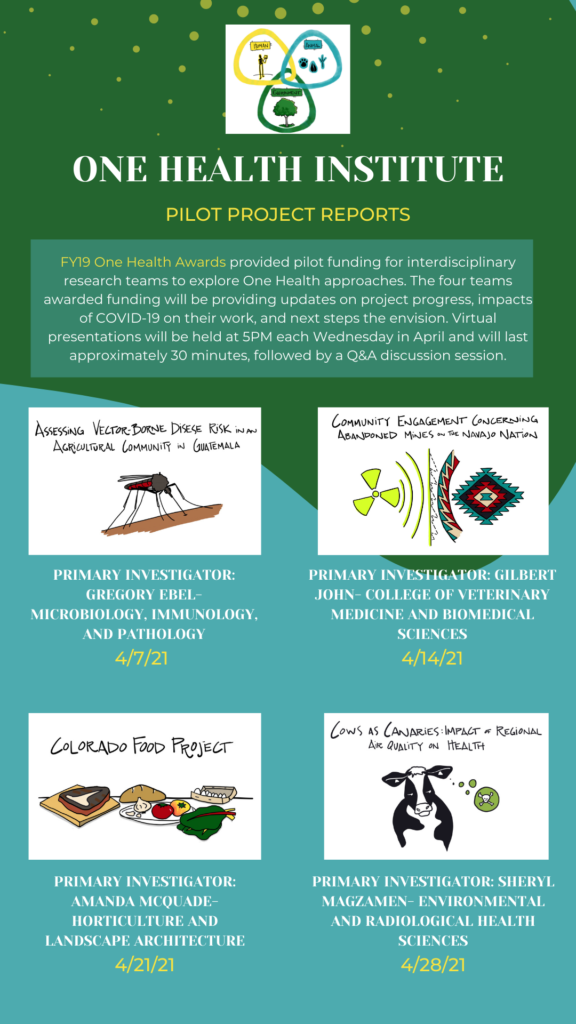2019 Pilot Projects
Four Colorado State University research teams have received grants through the One Health Research and Development program, a campus-wide funding opportunity that aims to create collaborations between human, animal and environmental health research.
Spring Pilot Project Seminar Series
Every Wednesday in April, 5-6 p.m.
FY19 One Health Awards provided pilot funding for interdisciplinary research teams to explore One Health approaches. The four teams awarded funding will be providing updates on project progress, impacts of COVID-19 on their work, and next steps they envision. Visual presentations will be held at 5pm each Wednesday in April and will last approximately 30 minutes, followed by a Q&A discussion session.
Assessing Vector-Borne Disease Risk in an Agricultural Community in Guatemala
Primary Investigator: Gregory Ebel- Microbiology, Immunology, and Pathology
According to the World Health Organization, vector-borne diseases account for more than 700,000 deaths annually. Existing systems to identify and study these diseases before they lead to pandemics can be cost-prohibitive or invasive to participants. This research team will pilot a new approach to study the transmission of infectious diseases between humans or from animals to humans.
Watch the Seminar
Passcode: #w3$0!TL
Community Engagement Concerning Abandon Mines on the Navajo Nation
Primary Investigator: Gilbert John- College of Veterinary Medicine and Biomedical Sciences
Uranium mining on Navajo lands took place from 1940-1969 and to this day, the Navajo people are still exposed to levels of radioactive materials which can contribute to adverse health effects. The goal of this project is to frame the importance of the psychological impacts of the uranium disaster among the Navajo people, and collaboratively contribute to the health and well-being of the Sweetwater Chapter community of the Navajo Nation.
Watch the Seminar
Passcode: G0+fTdCE
Cows as Canaries: Impact of Regional Air Quality on Health
Primary Investigator: Sheryl Magzamen- Environmental and Radiological Health Sciences
The population in Weld and Larimer Counties is expected to double by 2050. This population increase is projected for a region that already experiences some of the state’s highest averages of air pollution. This research team will look at the effects of air particulates on the region’s large dairy cow industry which may serve as an informative sentinel for human health.
Watch the Seminar
Passcode: 494.nN+y
Colorado Food Project
Primary Investigator: Amanda McQuade- Horticulture and Landscape Architecture
Nearly one in 10 Coloradans are unable to afford enough food for a healthy, active lifestyle. Food insecurity can have significant impacts on health and is associated with a wide variety of chronic diseases. This team will help support the immediate needs of food insecure populations and establish additional relationships to connect faculty, students and staff with research and engagement opportunities in diverse socioeconomic regions of the state.
Join Zoom meeting
Passcode: ?+0#aEMp



